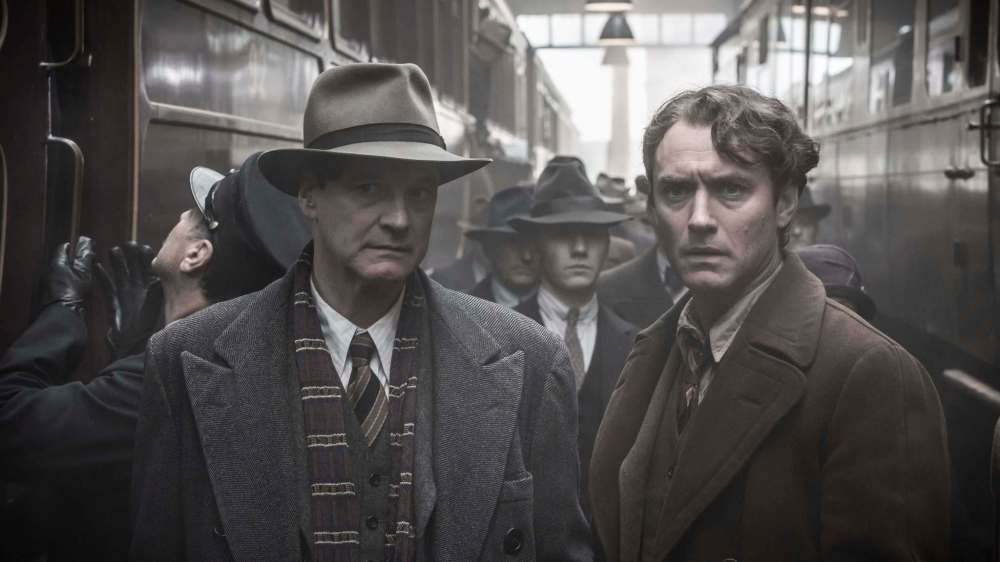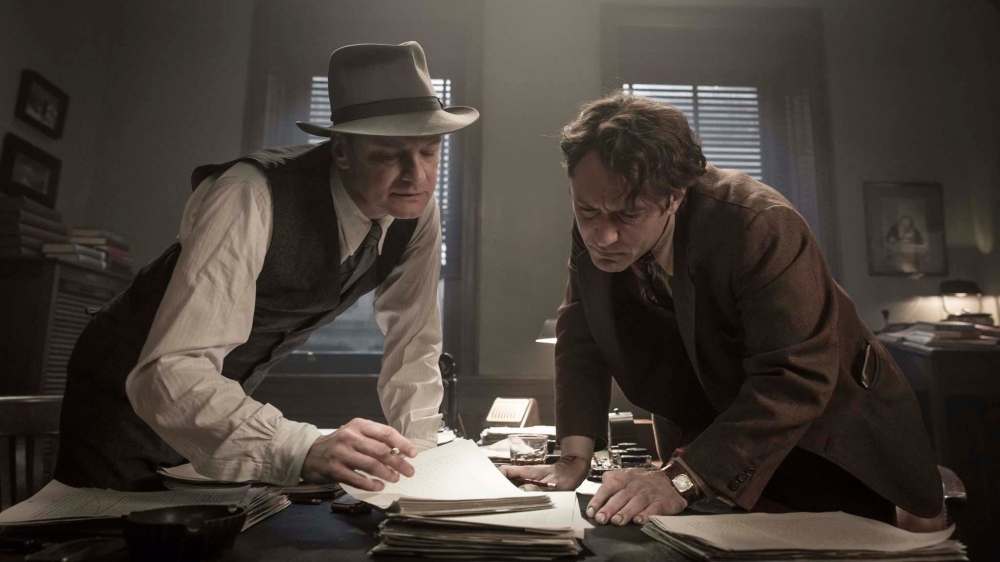Golden age of bromance
Clash of literary heroes lacks brilliant spark
Advertisement
Read this article for free:
or
Already have an account? Log in here »
To continue reading, please subscribe:
Monthly Digital Subscription
$0 for the first 4 weeks*
- Enjoy unlimited reading on winnipegfreepress.com
- Read the E-Edition, our digital replica newspaper
- Access News Break, our award-winning app
- Play interactive puzzles
*No charge for 4 weeks then price increases to the regular rate of $19.00 plus GST every four weeks. Offer available to new and qualified returning subscribers only. Cancel any time.
Monthly Digital Subscription
$4.75/week*
- Enjoy unlimited reading on winnipegfreepress.com
- Read the E-Edition, our digital replica newspaper
- Access News Break, our award-winning app
- Play interactive puzzles
*Billed as $19 plus GST every four weeks. Cancel any time.
To continue reading, please subscribe:
Add Free Press access to your Brandon Sun subscription for only an additional
$1 for the first 4 weeks*
*Your next subscription payment will increase by $1.00 and you will be charged $16.99 plus GST for four weeks. After four weeks, your payment will increase to $23.99 plus GST every four weeks.
Read unlimited articles for free today:
or
Already have an account? Log in here »
Hey there, time traveller!
This article was published 24/06/2016 (3434 days ago), so information in it may no longer be current.
Max Perkins, the man who red-pencilled such authors as Ernest Hemingway, F. Scott Fitzgerald and Thomas Wolfe, has been described as the most famous editor in America. Clearly, that’s not very famous, especially since the golden age of publishing depicted in this oddly uncertain biopic has receded into the past.
Skyfall screenwriter John Logan works from A. Scott Berg’s 1978 biography Max Perkins: Editor of Genius. The book’s title suggests a double meaning: Perkins edited geniuses but also possessed a steady, judicious genius of his own. While Logan’s script makes a few noble attempts with that latter interpretation — close-up footage of dramatic strikethroughs and heroic late-night margin-scribbling — it ends up focusing on the relationship between mild Max (Colin Firth) and wild Thomas Wolfe (Jude Law), ceding most of the genius territory to the scenery-hogging novelist.
When the manuscript of the book that will become Look Homeward, Angel first arrives on Max’s desk at Scribner’s in 1928, he looks dubious. “Double-spaced, I hope?”
Max is taken with the sprawling, poetic prose, however, reading it on the train to suburban Connecticut, and agrees to publish. Tom is at first ecstatic: “I know it’s too long. I’ll cut out anything you say!”
But by the time the men have fought through Of Time and the River, Tom’s massive, messy follow-up, their relationship has become strained. Tom starts to complain Max has crippled his work with his cuts.
There are glints of insight into the creative process and the mysterious alchemy of friendship, but Logan and first-time director Michael Grandage too often turn their material into a clichéd literary bromance. Max, living in a house of women — wife Louise (Laura Linney) and five daughters — is seen as a father longing for a son. Tom, for whom the premature death of his father was a defining event, is a son looking for a father.
Playing a man who keeps his fedora on even when wearing pyjamas, Firth offers a Yankee version of the many upright, reticent Englishmen he has played. Law, on the other hand, feels badly off in his pivotal part. He’s already six years older than Wolfe was when he died (at 37), and his overplayed North Carolina drawl can be painful, especially in his roaring-drunk scenes, of which there are too many.
At one point, Tom marvels at all the “man-sweat” that has gone into the books on Max’s shelves. For the most part, the film buys into Tom’s macho myth of genius, which suggest a great writer’s task is to suck up life in hard-drinking, whoring gulps on the night streets of New York and then spew it back out with his blood. It’s almost quaint, really.

Max suggests there might be other ways to live and create, and the script dutifully indicates the marginalized positions of the women in the men’s lives. Linney makes the most of her underwritten part, but Nicole Kidman struggles as Aline Bernstein, Tom’s patron and lover, who swings wildly from chilly, controlling harpy to abandoned wreck.
Dominic West drops in as Papa Hemingway, marlin fishing in the Florida Keys, and Guy Pearce has a few fine, underplayed scenes as Fitzgerald. But most of the story is spent with Law’s Tom, who takes all the air out of the room.
Too often literal rather than literary, stagey rather than cinematic, Genius can’t live up to its title, and ultimately its good intentions are undone by mediocre instincts.
alison.gillmor@freepress.mb.ca

Studying at the University of Winnipeg and later Toronto’s York University, Alison Gillmor planned to become an art historian. She ended up catching the journalism bug when she started as visual arts reviewer at the Winnipeg Free Press in 1992.
Our newsroom depends on a growing audience of readers to power our journalism. If you are not a paid reader, please consider becoming a subscriber.
Our newsroom depends on its audience of readers to power our journalism. Thank you for your support.


